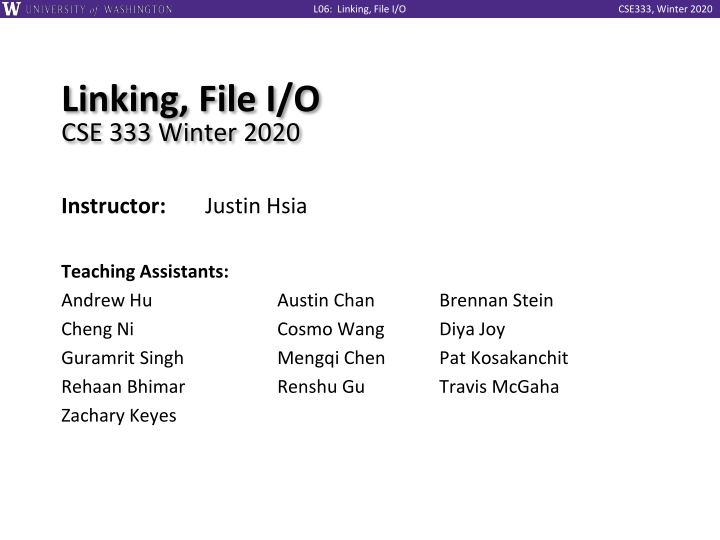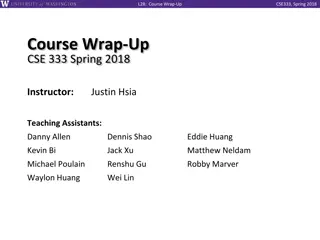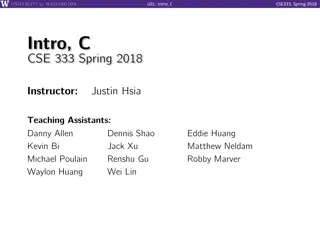
Linking and File I/O in CSE333 Winter 2020
"Explore linking, file I/O, visibility of symbols, namespace problems, external and internal linkage in C programming. Learn about external and static declarations, global variables, functions, and their visibility across files. Get insights into stream buffering with C standard library."
Download Presentation

Please find below an Image/Link to download the presentation.
The content on the website is provided AS IS for your information and personal use only. It may not be sold, licensed, or shared on other websites without obtaining consent from the author. If you encounter any issues during the download, it is possible that the publisher has removed the file from their server.
You are allowed to download the files provided on this website for personal or commercial use, subject to the condition that they are used lawfully. All files are the property of their respective owners.
The content on the website is provided AS IS for your information and personal use only. It may not be sold, licensed, or shared on other websites without obtaining consent from the author.
E N D
Presentation Transcript
L06: Linking, File I/O CSE333, Winter 2020 Linking, File I/O CSE 333 Winter 2020 Instructor: Justin Hsia Teaching Assistants: Andrew Hu Cheng Ni Guramrit Singh Rehaan Bhimar Zachary Keyes Austin Chan Cosmo Wang Mengqi Chen Renshu Gu Brennan Stein Diya Joy Pat Kosakanchit Travis McGaha
L06: Linking, File I/O CSE333, Winter 2020 Administrivia Exercise 5 posted yesterday, due Wednesday Exercise 6 posted today, also due Wednesday Homework 1 due next Thursday (1/23) Watch that HashTable doesn t violate the modularity of LinkedList Watch for pointer to local (stack) variables Draw memory diagrams! Use a debugger (e.g. gdb) and valgrind Please leave STEP # markers for graders! Late days: don t tag hw1-final until you are really ready Extra Credit: if you add unit tests, put them in a new file and adjust the Makefile 2
L06: Linking, File I/O CSE333, Winter 2020 Lecture Outline Visibility of Symbols extern, static File I/O with the C standard library C Stream Buffering 3
L06: Linking, File I/O CSE333, Winter 2020 Namespace Problem If we define a global variable named counter in one C file, is it visible in a different C file in the same program? Yes, if you use external linkage The name counter refers to the same variable in both files The variable is defined in one file and declared in the other(s) When the program is linked, the symbol resolves to one location No, if you use internal linkage The name counter refers to a different variable in each file The variable must be defined in each file When the program is linked, the symbols resolve to two locations 4
L06: Linking, File I/O CSE333, Winter 2020 External Linkage extern makes a declaration of something externally- visible Works slightly differently for variables and functions #include <stdio.h> #include <stdio.h> // A global variable, defined and // initialized here in foo.c. // It has external linkage by // default. int counter = 1; // "counter" is defined and // initialized in foo.c. // Here, we declare it, and // specify external linkage // by using the extern specifier. extern int counter; int main(int argc, char** argv) { printf("%d\n", counter); bar(); printf("%d\n", counter); return 0; } void bar() { counter++; printf("(b): counter = %d\n", counter); } foo.c bar.c 5
L06: Linking, File I/O CSE333, Winter 2020 Internal Linkage static (in the global context) restricts a definition to visibility within that file #include <stdio.h> #include <stdio.h> // A global variable, defined and // initialized here in foo.c. // We force internal linkage by // using the static specifier. static int counter = 1; // A global variable, defined and // initialized here in bar.c. // We force internal linkage by // using the static specifier. static int counter = 100; int main(int argc, char** argv) { printf("%d\n", counter); bar(); printf("%d\n", counter); return 0; } void bar() { counter++; printf("(b): counter = %d\n", counter); } foo.c bar.c 6
L06: Linking, File I/O CSE333, Winter 2020 Function Visibility // By using the static specifier, we are indicating // that foo() should have internal linkage. Other // .c files cannot see or invoke foo(). static int foo(int x) { return x*3 + 1; } // Bar is "extern" by default. Thus, other .c files // could declare our bar() and invoke it. int bar(int x) { return 2*foo(x); } bar.c #include <stdio.h> extern int bar(int x); // "extern" is default, usually omit int main(int argc, char** argv) { printf("%d\n", bar(5)); return 0; } main.c 7
L06: Linking, File I/O CSE333, Winter 2020 STYLE TIP Linkage Issues Every global (variables and functions) is extern by default Unless you add the static specifier, if some other module uses the same name, you ll end up with a collision! compiler (or linker) error Best case: Worst case: stomp all over each other It s good practice to: Use staticto defend your globals Hide your private stuff! Place external declarations in a module s header file Header is the public specification 8
L06: Linking, File I/O CSE333, Winter 2020 Static Confusion C has a differentuse for the word static : to create a persistent local variable The storage for that variable is allocated when the program loads, in either the .data or .bss segment Retains its value across multiple function invocations void foo() { static int count = 1; printf("foo has been called %d times\n", count++); } void bar() { int count = 1; printf("bar has been called %d times\n", count++); } int main(int argc, char** argv) { foo(); foo(); bar(); bar(); return 0; } static_extent.c 9
L06: Linking, File I/O CSE333, Winter 2020 Additional C Topics Teach yourself! man pages are your friend! String library functions in the C standard library #include <string.h> strlen(), strcpy(), strdup(), strcat(), strcmp(), strchr(), strstr(), #include <stdlib.h> or #include <stdio.h> atoi(), atof(), sprint(), sscanf() How to declare, define, and use a function that accepts a variable- number of arguments (varargs) unions and what they are good for enums and what they are good for Pre- and post-increment/decrement Harder: the meaning of the volatile storage class 10
L06: Linking, File I/O CSE333, Winter 2020 Lecture Outline Visibility of Symbols extern, static File I/O with the C standard library C Stream Buffering This is essential material for the next part of the project (hw2)! 11
L06: Linking, File I/O CSE333, Winter 2020 File I/O We ll start by using C s standard library These functions are part of glibc on Linux They are implemented using Linux system calls (POSIX) C s stdio defines the notion of a stream A sequence of characters that flows to and from a device Can be either text or binary; Linux does not distinguish Is buffered by default; libc reads ahead of your program Three streams provided by default: stdin, stdout, stderr You can open additional streams to read and write to files C streams are manipulated with a FILE* pointer, which is defined in stdio.h 12
L06: Linking, File I/O CSE333, Winter 2020 C Stream Functions (1 of 2) Some stream functions (complete list in stdio.h): FILE* fopen(filename, mode); FILE* fopen(filename, mode); Opens a stream to the specified file in specified file access mode int fclose(stream); int fclose(stream); Closes the specified stream (and file) int fprintf(stream, format, ...); int fprintf(stream, format, ...); Writes a formatted C string printf(...); is equivalent to fprintf(stdout, ...); int fscanf(stream, format, ...); int fscanf(stream, format, ...); Reads data and stores data matching the format string 13
L06: Linking, File I/O CSE333, Winter 2020 C Stream Functions (2 of 2) Some stream functions (complete list in stdio.h): FILE* fopen(filename, mode); FILE* fopen(filename, mode); Opens a stream to the specified file in specified file access mode int fclose(stream); int fclose(stream); Closes the specified stream (and file) int fprintf(stream, format, ...); size_t fwrite(ptr, size, count, stream); Writes an array of count elements of size bytes from ptr to stream int fscanf(stream, format, ...); size_t fread(ptr, size, count, stream); Reads an array of count elements of size bytes from stream to ptr 14
L06: Linking, File I/O CSE333, Winter 2020 C Stream Error Checking/Handling Some error functions (complete list in stdio.h): void perror(message); Prints message followed by an error message related to errno to stderr void perror(message); int ferror(stream); int ferror(stream); Checks if the error indicator associated with the specified stream is set void clearerr(stream); int clearerr(stream); Resets error and EOF indicators for the specified stream 15
L06: Linking, File I/O CSE333, Winter 2020 C Streams Example cp_example.c #include <stdio.h> #include <stdlib.h> #include <errno.h> #define READBUFSIZE 128 int main(int argc, char** argv) { FILE *fin, *fout; char readbuf[READBUFSIZE]; size_t readlen; if (argc != 3) { fprintf(stderr, "usage: ./cp_example infile outfile\n"); return EXIT_FAILURE; // defined in stdlib.h } // Open the input file fin = fopen(argv[1], "rb"); // "rb" -> read, binary mode if (fin == NULL) { perror("fopen for read failed"); return EXIT_FAILURE; } ... 16
L06: Linking, File I/O CSE333, Winter 2020 C Streams Example cp_example.c int main(int argc, char** argv) { ... // previous slide s code // Open the output file fout = fopen(argv[2], "wb"); // "wb" -> write, binary mode if (fout == NULL) { perror("fopen for write failed"); fclose(fin); return EXIT_FAILURE; } // Read from the file, write to fout while ((readlen = fread(readbuf, 1, READBUFSIZE, fin)) > 0) { if (fwrite(readbuf, 1, readlen, fout) < readlen) { perror("fwrite failed"); fclose(fin); fclose(fout); return EXIT_FAILURE; } } ... // next slide s code } 17
L06: Linking, File I/O CSE333, Winter 2020 C Streams Example cp_example.c int main(int argc, char** argv) { ... // two slides ago s code ... // previous slide s code // Test to see if we encountered an error while reading if (ferror(fin)) { perror("fread failed"); fclose(fin); fclose(fout); return EXIT_FAILURE; } fclose(fin); fclose(fout); return EXIT_SUCCESS; } 18
L06: Linking, File I/O CSE333, Winter 2020 Lecture Outline Visibility of Symbols extern, static File I/O with the C standard library C Stream Buffering 19
L06: Linking, File I/O CSE333, Winter 2020 Buffering By default, stdio uses buffering for streams: Data written by fwrite() is copied into a buffer allocated by stdioinside your process address space As some point, the buffer will be drained into the destination: When you explicitly call fflush() on the stream When the buffer size is exceeded (often 1024 or 4096 bytes) For stdout to console, when a newline is written ( line buffered ) or when some other function tries to read from the console When you call fclose() on the stream When your process exits gracefully (exit() or return from main()) 20
L06: Linking, File I/O CSE333, Winter 2020 Why Buffer? Performance avoid disk accesses Group many small writes into a single larger write Disk Latency = (Jeff Dean from LADIS 09) Convenience nicer API We ll compare C s fread()with POSIX s read() 21
L06: Linking, File I/O CSE333, Winter 2020 Why NOT Buffer? Reliability the buffer needs to be flushed Loss of computer power = loss of data Completion of a write (i.e. return from fwrite()) does not mean the data has actually been written What if you signal another process to read the file you just wrote to? Performance buffering takes time Copying data into the stdio buffer consumes CPU cycles and memory bandwidth Can potentially slow down high-performance applications, like a web server or database ( zero-copy ) When is buffering faster? Slower? 22
L06: Linking, File I/O CSE333, Winter 2020 Disabling C s Buffering Explicitly turn off with setbuf(stream, NULL) Use POSIX APIs instead of C s No buffering is done at the user level We ll see these soon But what about the layers below? The OS caches disk reads and writes in the file system buffer cache Disk controllers have caches too! 23
L06: Linking, File I/O CSE333, Winter 2020 Extra Exercise #1 Modify the linked list code from Lecture 4 Extra Exercise #3 Add static declarations to any internal functions you implemented in linkedlist.h Add a header guard to the header file 24
L06: Linking, File I/O CSE333, Winter 2020 Extra Exercise #2 Write a program that: Uses argc/argv to receive the name of a text file Reads the contents of the file a line at a time Parses each line, converting text into a uint32_t Builds an array of the parsed uint32_t s Sorts the array Prints the sorted array to stdout bash$ cat in.txt 1213 3231 000005 52 bash$ ./extra1 in.txt 5 52 1213 3231 bash$ Hint: use man to read about getline, sscanf, realloc, and qsort 25
L06: Linking, File I/O CSE333, Winter 2020 Extra Exercise #3 Write a program that: Loops forever; in each loop: Prompt the user to input a filename 00000000 50 4b 03 04 14 00 00 00 00 00 9c 45 26 3c f1 d5 00000010 68 95 25 1b 00 00 25 1b 00 00 0d 00 00 00 43 53 00000020 45 6c 6f 67 6f 2d 31 2e 70 6e 67 89 50 4e 47 0d 00000030 0a 1a 0a 00 00 00 0d 49 48 44 52 00 00 00 91 00 00000040 00 00 91 08 06 00 00 00 c3 d8 5a 23 00 00 00 09 00000050 70 48 59 73 00 00 0b 13 00 00 0b 13 01 00 9a 9c 00000060 18 00 00 0a 4f 69 43 43 50 50 68 6f 74 6f 73 68 00000070 6f 70 20 49 43 43 20 70 72 6f 66 69 6c 65 00 00 00000080 78 da 9d 53 67 54 53 e9 16 3d f7 de f4 42 4b 88 00000090 80 94 4b 6f 52 15 08 20 52 42 8b 80 14 91 26 2a 000000a0 21 09 10 4a 88 21 a1 d9 15 51 c1 11 45 45 04 1b ... etc ... Reads a filename from stdin Opens and reads the file Prints its contents to stdout in the format shown: Hints: Use man to read about fgets Or, if you re more courageous, try man 3 readline to learn about libreadline.a and Google to learn how to link to it 26



